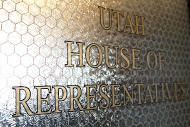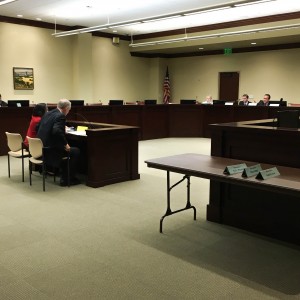SALT LAKE CITY–A bill that would divide the state into single-member districts for each congressional, state house, state senate and state school board district will be studied during during the interim before the 2017 Legislature.

Redistricting is a process in which new congressional and state legislative districts are drawn. Usually, this occurs every 10 year after the U. S. Census is completed. During the most recent redistricting process, some criticized Republican lawmakers for redrawing lines that eliminated Democratic House and Senate members.
Each individual state decides who gets to draw these district lines. In Utah, the line drawers are only the state legislators. However, Rep. Rebecca Chavez-Houck, D-Salt Lake City, hopes to change that. The representative proposed HB313, a bill that would establish the Advisory Redistricting Commission and would also enact provisions for the commission’s membership, function and duties.
“Back in 2009, I actually ran very similar legislation that proposed the establishment of an Advisory Redistricting Commission. At that time, there were concerns from the legislature on a couple of main grounds,” Chavez-Houck said. “This bill proposes that the Commission provide counsel to and provide to the legislature for all of the redistricting that the legislature is responsible for.”
Last year, the U.S. Supreme Court issued a ruling in the case of the Arizona State Legislature vs. the Arizona Independent Redistricting Commission. The court ruled in favor of the Commission and upheld the right of the people to create redistricting organizations. Rep. Chavez-Houck used this example to demonstrate how surrounding states have already passed similar legislation.
In 2012, Tim Chambless, a University of Utah professor and the Chair of the Salt Lake City Redistricting Commission, worked weekly to design three proposed plans that would divide the city’s population into six equally populated districts.
“After the election of 2010, Salt Lake Council decided to create aniIndependent Non-Partisan Advisory Council. In 2011, we submitted our plans and with a small modification, the plan was approved,” Chambless said. “During the process and subsequently, we haven’t heard any criticism that the plan was somehow partisan but rather as objective as we could be. Here we are now, looking forward to trying to improve this process.”

The proposal affects statewide political power. Ultimately, redistricting determines which party controls the state and local government. Some legislatures, such as Rep. Merrill Nelson, R-Grantsville, think the bill will restore public confidence.
“I think we all sense a pretty deep level of public mistrust and dissatisfaction in the redistricting process. We see voting levels dropping off and we see a lot of apathy. Something like this would go a long way in restoring the public confidence in the process,” Nelson said.
Nelson, a strong proponent of the bill, went on to argue that legislators are not giving up their power by supporting this bill but rather receiving more opinions and ideas.
“This is merely an Advisory Council, so we do not relinquish our authority, but we seek input from others who have insight and experience and who can guide us. For every legislator here, for all 104 of us, there are hundreds of good people right behind us in every district that could do the job just as well as we can,” Rep. Nelson said. “If one of us leaves, it is not the end of the world for us, or the state. Legislative lines should not be drawn with incumbency in mind. No one owns a seat, these are public seats, and we represent the public. We can strengthen the process by seeking advice.”
However, not all legislators saw benefits in the bill. Rep. Fred C. Cox, R-West Valley City, spoke against passing the bill.
“I believe that many of the maps that were presented by the redistricting committee ignored where incumbents were and ignored and partisan makeup. I don’t know that any of us that are as non-partisan as we would like to be. I’m not sure that another outside committee will solve the situation that I saw in 2011,” Cox said.
Rep. Patrice M. Arent, D-Salt Lake City, made the motion to send the bill the the House Rules Committee where it would be recommended for interim study.
“This is a complicated issue that I think we are not in a rush to do since we are not redrawing lines next year,” Arent said. “I would like to see all of us have a stake and make sure that we come together during the interim period.”
The next United States Census will be in 2020 with the redrawing of districts following soon after.




